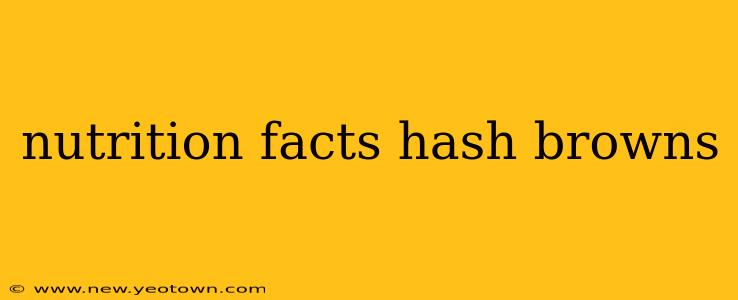Hash browns. Just the name conjures up images of crispy, golden-brown potatoes, a breakfast staple, a side dish star, and sometimes, even a guilty pleasure. But beneath that satisfying crunch lies a nutritional profile that’s worth understanding. Let's delve into the world of hash brown nutrition, uncovering the facts and answering some common questions.
My name's Alex, and I've spent years researching and writing about nutrition and healthy eating. While I can't offer specific medical advice, my goal is to empower you with the knowledge to make informed choices about your food.
How many calories are in hash browns?
The calorie count of hash browns varies wildly depending on several factors: the type of potato used, the amount of added oil or fat during cooking, the portion size, and any additional ingredients like cheese, onions, or peppers. A typical serving (around ½ cup) of restaurant-style hash browns can easily contain anywhere from 150 to 300 calories. Homemade versions, prepared with less oil, can be significantly lower, potentially falling into the 100-150 calorie range per serving. The key is mindful preparation.
What are the nutritional benefits of hash browns?
While hash browns aren't exactly a nutritional powerhouse, they do offer some benefits. Potatoes, the base ingredient, are a good source of potassium, an essential mineral for maintaining healthy blood pressure. They also contain some vitamin C and fiber, though processing and cooking methods can impact these levels. The fiber content, especially in versions made with less oil, can contribute to feelings of fullness and aid in digestion.
Are hash browns healthy?
This is a tricky question with no simple yes or no answer. The healthfulness of hash browns hinges heavily on how they're prepared. Hash browns fried in copious amounts of oil will be significantly higher in unhealthy fats and calories, negatively impacting their overall nutritional profile. On the other hand, baked or air-fried hash browns, using minimal added oil, present a considerably healthier alternative. Consider them a sometimes food, or carefully control portion sizes and preparation methods to fit them into a balanced diet.
How much fat is in hash browns?
Fat content, like calorie count, is highly variable. Deep-fried hash browns can be shockingly high in fat, primarily saturated and unhealthy trans fats. However, if you bake or air-fry them with a minimal amount of healthy oil (like olive oil) the fat content can be reduced significantly. Always check the nutritional information provided by restaurants or food manufacturers, if available.
How many carbs are in hash browns?
Hash browns are primarily composed of carbohydrates, mostly in the form of starch. A typical serving contains around 20-30 grams of carbohydrates. People managing their carbohydrate intake, such as those with diabetes, should be mindful of portion sizes and consider lower-carb alternatives if necessary.
Are hash browns a good source of protein?
No, hash browns are not a significant source of protein. Potatoes themselves contain some protein, but the amount is relatively low. If you're looking for a protein boost, pairing your hash browns with eggs, sausage, or bacon can be a solution.
What are the ingredients in hash browns?
The primary ingredient is always potatoes, typically russet potatoes for their fluffy texture. Depending on the recipe or restaurant, you might find added ingredients such as onions, peppers, garlic, cheese, or various spices. Always read ingredient lists carefully, especially if you have allergies or dietary restrictions.
By understanding the nutritional nuances of hash browns, you can make informed choices about how frequently you enjoy this popular dish and how you prepare it to minimize potential drawbacks. Remember, mindful eating is key!

